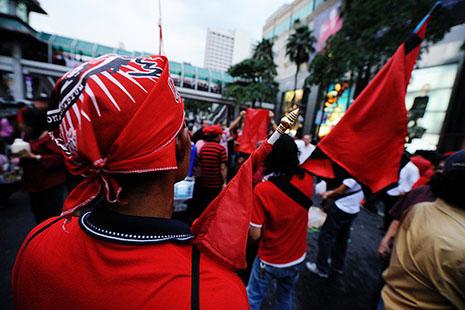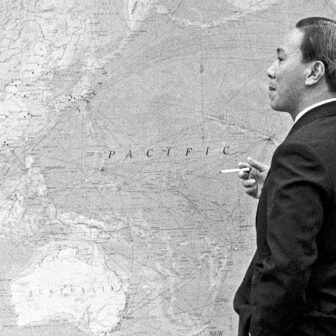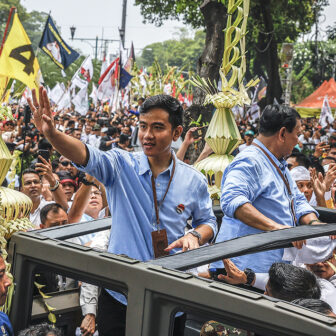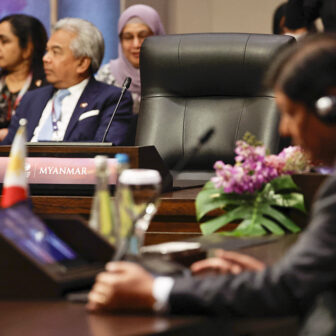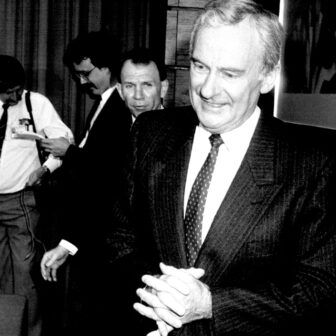THAILAND’s former prime minister, Thaksin Shinawatra, just won’t go away. Since 2005 his opponents have thrown everything at him – a coup, a jail sentence, a terrorism charge – in a dogged campaign to remove the country’s most popular politician from its political future. His supporters, the telegenic Red Shirts, have been threatened, imprisoned, beaten up and, in dozens of cases, shot dead on the streets of Bangkok during the unruly protests that punctuated the country’s political conflict in 2010.
But Thaksin lives to fight another round. And now, with his sister, Yingluck Shinawatra, celebrating her first year in the prime ministerial hot seat, the telecommunications billionaire and creator of Southeast Asia’s most successful recipe for populist politics is more aggressively pursuing his options for a triumphant return to the kingdom.
In April, he was in neighbouring Laos, to make offerings and generate good karma. Then he visited Cambodia to address tens of thousands of cheering Red Shirt supporters bussed across the border to welcome their hero; while there, he also scheduled a round of golf with Cambodian strongman Hun Sen. This swaggering regional tour, conducted under one of the heaviest security blankets imaginable, certainly served its purpose: it got tongues wagging.
Thaksin’s movements are becoming more frequent and high profile. His travel to democracies that were wary of his presence, such as Britain and the United States, is adding to his statesmanlike mystique. He is the roving, unofficial ambassador for his sister’s government, a government elected in the glow of his enduring popularity.
Through all of the ups and downs – ever since his Thai Rak Thai (Thais Love Thais) political party was first elected back in 2001 – Thaksin has enjoyed consistent voter support at a level unprecedented in Thai history. This means that his plan to return to Thailand, perhaps before the end of 2012, presents a special conundrum for a society where old wounds are unhealed and the stench of recent violence infuses political debate.
It was in April and May 2010 that Thais last experienced the horror of raging battles on the streets of Bangkok: Thais killing Thais for political ends. Over ninety died, and hundreds were injured. Culpability for those events is yet to be fully apportioned and partisan judgments about responsibility still prevail. A recipe for “reconciliation” – still only half-cooked, and considered unpalatable by many on all sides of politics – has served to muddle assessments of exactly what should happen next.
Earlier this year the ban on political activities by 111 former executives of the Thai Rak Thai party expired. This means that Thaksin’s “A-team,” including former ministers, tacticians and dealmakers, is available for political appointments. Some of them may no longer feel energised by politics and will opt to stay out of the fray; others are likely to be reintroduced to the battle with renewed vigour. Among Thaksin’s most trusted lieutenants are a few still very much spoiling for a fight.
Their unfinished business centres on the September 2006 coup that ousted Thaksin and Thai Rak Thai from power. The move was attributed to a nexus of palace and military interests threatened by Thaksin’s overwhelming popularity, ego, wealth and ambition.
In the years since then, Thailand’s military, palace, bureaucratic and judicial power brokers have remained sensitive about any discussion of the political role of the royal family. In recent years the country’s lese-majesty law, which demands harsh penalties for any perceived slights against the king or senior royals, has become newly problematic. Since the crackdown on the Red Shirt protests of April and May 2010, anti-palace graffiti and slogans have infused rallies with radical sentiments.
But those Red Shirts who had hoped that Prime Minister Yingluck would support the reformist or revolutionary impulses among rank-and-file Red Shirts have been disappointed. Instead, she has been pictured paying her respects to the king’s enforcer, Privy Council chairman General Prem Tinsulanonda, and doing whatever else she can to remain cosy with military and palace insiders.
Under her government, Thailand continues to lock up critics of the palace and determinedly pursues legal proceedings against any minnows who dare challenge royal prestige. What Yingluck’s government knows is that the lese-majesty law holds back an avalanche of scrutiny and criticism looming over the palace. They have decided that this is not the time to unleash its destructive potential.
The perverse consequence of continuing to clamp down on critical references to the royal family is that intrigue, scuttlebutt and animosity multiply. Discussions of the most sensitive topics have not been eradicated and, like a festering wound, are left to draw attention in ways unwanted and uncomfortable. The current consensus that Thai society benefits from restrictions on royal commentary has become Yingluck’s only defence against more radical Red Shirt elements.
In return for deference to certain palace priorities, Yingluck appears to enjoy the connivance of the military officers who deposed her brother in 2006. They are still deeply uncomfortable with the Shinawatra dynasty, and on occasion uniformed officers voice their concerns in public. Perhaps they now also appreciate that a coup, no matter how appealing in the short-term, is profoundly disruptive to long-term political planning.
During this fragile stalemate between the warring sides, some important disputes have been taken to the courts. In July, Thailand’s Constitutional Court was forced to pass judgement on the legality of the government’s efforts to amend the post-coup constitution. Opponents of constitutional change, who are drawn from the anti-Thaksin ranks, have asserted that Yingluck’s government is quietly working to undermine the monarchy through changes to the law. The ruling, if it went against the government, had the potential to ignite yet another storm of protest and counter-protest. Many in Thailand breathed a sigh of relief when the court ruled in the government’s favour.
INTRIGUINGLY, no large-scale anti-government demonstrations have taken place during the first year of Yingluck’s prime ministership. Even the most active anti-Thaksin street campaigner, Sondhi Limthongkul, has found himself distracted and exposed. In a sign that the high level backing he received for his earlier political activism has thinned, he was sentenced in February 2012 to twenty years’ imprisonment.
But the confrontation between pro- and anti-Thaksin forces is definitely not over. New groups of anti-Thaksin activists have emerged and appear to be readying themselves for future struggles.
The battle will not end until the relationship between the palace and political power is settled once and for all. There are a number of factors that have emerged in the past year to make the intersection of charismatic royal authority and popular political mandates all the more problematic.
First, the electoral popularity of Thaksin is, on the evidence from 2011, a strong as ever. The Pheua Thai (For the Thais) party, the third iteration of Thaksin’s original Thai Rak Thai, won 265 of the 500 seats. It governs in coalition with five other parties, including Chart Thai Pattana and Phalang Chon.
Thaksin commands the affection of the many Thais who feel that his rule from 2001 to 2006 was a golden age. They relish the thought of a Thailand that is strong and proud, able to take its place at the highest tables ly. They still crave the attention that he lavished on the concerns of ordinary folk: the labourers, farmers and other workers who rallied to his side. They may not feel Thaksin was their saviour but he did, at least, make an effort to speak their language. And as memories have faded during his years of absence, his spin doctors have increasingly been able to present his rule as a blissful time.
Indeed, the politics of Thailand’s recent past is caught in a chamber of realities and counter-realities where self-serving narratives are filled with half-truths. There is no disinterested version of the story on which reconciliation and peace can be built.
Second, Thaksin is explicitly mulling the timing of a possible return to Thailand. Partly he is seeking to salvage his legacy and write yet another chapter in the country’s political history. But he also has assets at stake – perhaps $2 billion, confiscated after the 2006 coup.
In exile, his disembodied presence, a regular fixture of phone-ins, conference calls and interviews, has replaced the flesh-and-blood Thaksin. There are signs that he is tired of that role: his 390,000 followers on Twitter have not heard from him since November last year.
What Thaksin now needs is a deal. He is seeking an amnesty for his 2008 corruption conviction and some arrangement to return confiscated assets. Beyond that, the terms of any deal with his enemies are the subject of great speculation.
His opponents remain preoccupied with the palace succession and the need to ensure the continuity of the Chakri dynasty. There are also those hoping to keep control of what Forbes estimates could be a $30 billion royal fortune.
With this up for grabs, those who launched the coup in 2006 may feel that while Thaksin is a nuisance he is not the main enemy. For some, the bloodshed and lost opportunities since 2006 could also have catalysed a sense that endless struggle with Thaksin is counterproductive. And they also know that many Thais are quietly sick and tired of the political conflict that has become so prevalent since Thaksin was deposed.
The $30 billion question is: what happens when eighty-four-year-old King Bhumibol dies? It remains the question that nobody is prepared to touch. But if we have understood anything of Thailand’s political action since the 2006 coup then any tentative answer matters a great deal. It provides an explanation for what we have seen and what, we assume, lurks just out of sight. On everyone’s lips there is an unspoken view that things could get very bad as Thailand seeks to clarify its longer term political future.
Unresolved questions about Crown Prince Vajiralongkorn’s reckless behaviour haunt the equation. His apparent incapacity to generate consistent popular goodwill must infuriate those pragmatic types who have sought to provide every chance for his success. Innuendo about his lifestyle has only been reinforced in recent years by WikiLeaks’s release of confidential – and critical – official commentary, which has shifted longstanding speculation into a new realm of plausibility and awkwardness. Millions of Thais have stopped believing in the official, benign portrayal of the Crown Prince.
From this perspective, Thaksin’s rule, for all of its problems of patronage, violence and greed, is comparatively appealing. At the ballot box it wins every time.
Under these circumstances the final months of 2012 are likely to see more aggressive efforts by Thaksin to return to the kingdom. He will not want to miss an opportunity to pay his final respects to King Bhumibol. It is easy to overlook Thaksin’s own royalist views and the fact that he has worked very closely with the palace and the military in the past. The coup put an end to that, but Yingluck’s words and actions have signalled that rapprochement is conceivable.
Radical shifts in allegiance have happened before in Thai politics and they will happen again. Far from being a republican trouble-maker, Thaksin may ultimately prove a key ally for the palace in any future crisis. His capacity for personal reinvention is legendary, and this means that as he and the palace both face the challenges of the years ahead they may find that a common cause can guarantee mutual survival.
Thaksin has a track record of indestructibility. It makes sense that in the difficult years to come the palace will want him on their side. •
